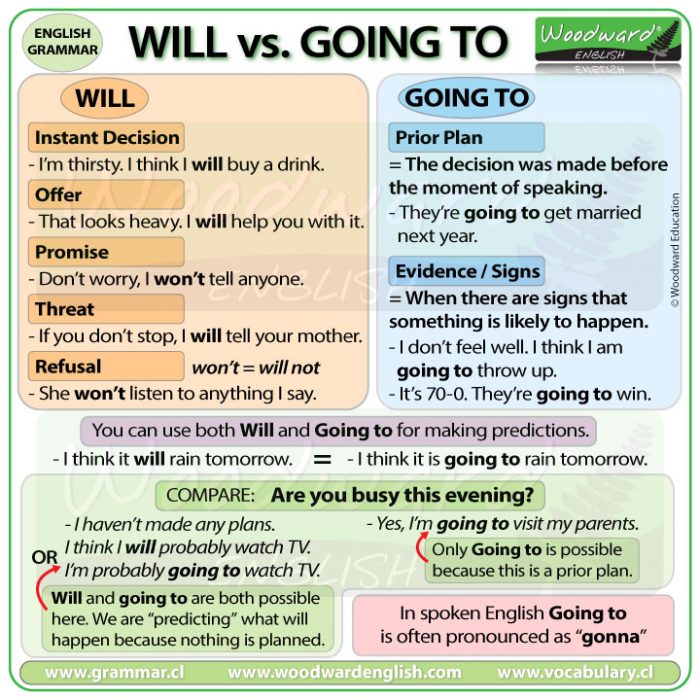WILL vs. GOING TO – English Grammar Lesson
In general, WILL and GOING TO are used to talk about the future.
- I will help you tomorrow. (Tomorrow is in the future)
- I think it’s going to rain later. (Later is a non-specific time in the future)
- We will visit you next week. (Next week is a time in the future)
- They’re going to get married next year. (Next year is a time in the future)
BUT, What is the difference between WILL and GOING TO?
When do we use WILL? When do we use GOING TO?
Future Predictions
Both Will and Going to can be used for making predictions about the future without having a real difference in meaning. We think or expect something to happen in the future.
- I think it will rain tomorrow.
- I think it’s going to rain tomorrow.
Both of these sentences are making a prediction about the weather tomorrow. We are not 100% certain how the weather will be, we are just predicting it.
- I’m sure you will do well in your exam.
- I’m sure you’re going to do well in your exam.
I’m making another prediction about your exam result!
So, both WILL and GOING TO can be used for predictions.
BUT, there are other situations or uses where you use one more than the other. Let’s look at these other uses of WILL and GOING TO now.
Uses of WILL in English
We generally use WILL in the following situations:
🌿 Instant Decision 🌿
This is an instant decision about the immediate future. We more or less decide at the same time the words are spoken.
- I’m thirsty. I think I’ll buy a drink. (I just thought of it now)
- I’ll ask John if he knows where my keys are. (I just decided to ask him)
- I think we’llgo right now. (I just decided to do this right now)
- I’ll take that one thank you. (I just decided which one right now)
🌿 Offer 🌿
You can use WILL when you are offering to do something for someone in the future.
- You look tired. I’ll cook dinner tonight.
- I’ll drive you to work tomorrow if you like.
- We’ll help you with anything you need.
- I’ll give you a discount if you buy it right now.
- That looks heavy. I’ll help you with it.
🌿 Promise 🌿
You can use WILL when you promise to do something for someone in the future.
When two people link their little fingers together and they make a promise to each other, this is called a pinky promise.
- I promise I will call you every day.
- I’ll come and see you next week. (I promise)
- Don’t worry, we’ll make sure nothing happens to you.
- I’ll buy you a new bike when I get paid.
🌿 Threat 🌿
You can use WILL when you are making a threat that something will happen.
- If you don’t stop, I will tell your mother. (You are threatening to tell her)
- You’ll pay for this!
- You will get fired if you don’t finish the job today.
🌿 Habit – predictable behaviour 🌿
You can use WILL for a habit that is a predictable behaviour.
- My son will fall asleep whenever we travel anywhere by car. (This is predictable, you know it is going to happen)
- He will give up if he starts losing. He always does that. (It is a habit of his to do this)
🌿 Refusal 🌿
You use WON’T when someone or something refuses to do something. Someone says they will not do something or if something doesn’t work.
Note: WON’T is a contraction (or a short way of saying) WILL NOT.
- I don’t care what you say, I won’t do it! (I refuse to do it!)
- They won’t help me clean the kitchen. (No, they are not going to help)
- She won’t listen to anything I say. (It is something she doesn’t want to do.)
- My car won’t start. (It won’t work)
Uses of GOING TO in English
BE GOING TO is normally used to indicate the future but with some type of connection to the present. We use it in the following situations:
🌿 Prior Plan 🌿
You can use GOING TO when you have already decided or planned to do something in the future. The decision was made before the moment of speaking.
- They’re going to get married next year. (They have planned this)
- I’m going to accept the job offer. (I decided this before telling you)
- She’s going to tell him when he arrives. (That is what she has decided to do)
- We’re going to start a new business together. (That is our plan)
🌿 Evidence & Signs 🌿
You can use GOING TO when there is evidence (or there are signs) that something is going to happen. Something is likely to happen based on the evidence or experience that you have.
- I think it’s going to rain – I just felt some drops.
- I don’t feel well. I think I’m going to throw up. (throw up = vomit)
- Jack hasn’t studied. He’s not going to pass his exam.
🌿 About to happen 🌿
You can use GOING TO when something is about to happen (any moment now).
- Watch out! It’s going to fall on you!
- Run! I think it’s going to explode.
- Look! Your ice cream is going to drip down your arm.
Compare Will vs. Going To
Let’s compare WILL and GOING TO together.
If someone asks:
- “What are you going to do tonight?”
(The person uses GOING TO because they probably assume you have plans)
You can say:
- “I’m going to watch a movie.”
I use GOING TO because it is a plan I made earlier (before I was asked the question). I already know which movie I’m going to watch. – In this case we cannot use WILL.
BUT, if I haven’t made any plans for this evening, then I could say:
- “I will probably watch TV.” OR
- “I’m probably going to watch TV.”
We can use either WILL or GOING TO in our response because we are predicting what will probably happen (since we haven’t made any plans).
Will vs. Going To – Summary Chart

A quick note:
Just so you know, both WILL and GOING TO generally refer to something happening in the future.
Don’t worry so much about using the correct one perfectly each time as even if you misuse them, a native speaker should understand your intention without any problems.
I hope you found this grammar lesson about WILL useful. If you did, please let other people know about it.
